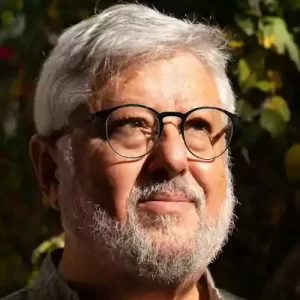While Israel restarts its bombing of the besieged territory as the truce with Hamas ends, the relatives of those still being held captive can only hope that another ceasefire is agreed and their loved ones will eventually be freed. Tom Bennett reports from Tel Aviv
Black plumes of smoke billowed over Gaza, while air sirens rang out across parts of Israel, signalling the seven-day truce between Israel and Hamas was over.
By early morning, Israeli jets had resumed bombing Gaza, as they had done for weeks in the wake of the Hamas attack inside Israel on 7 October that killed 1,200 people and saw around 240 others taken hostage. Prime Minister Benjamin Netanyahu said his government “is committed to achieving the goals of the war: releasing the hostages [and] eliminating Hamas.”
Health officials in Hamas-run Gaza said that more than 100 people were killed in Israeli airstrikes on Friday, adding to a total the territory’s health ministry says sits at more than 14,000 people. Israel’s military announced that it was dividing the entirety of Gaza into dozens of numbered blocks as a prelude, it said, to demanding targeted local evacuations in the crowded south of the strip before planned bombing. Leaflets were dropped over Gaza relaying this.
Qatar and Egypt, who mediated the initial ceasefire that led to the release of more than 100 Israeli and foreign national hostages in exchange for more than 180 Palestinians in Israeli prisons, are pushing to restart the truce.
For the families of hostages inside Gaza, there is a renewed fear of what will happen to their loved ones. By midday on Friday, hundreds had gathered at “Hostages Square” in central Tel Aviv to demonstrate in support of the 136 people still held captive inside Gaza.
“The end of the current deal is a huge disappointment for the families,” said Ilan Zecharya, who took to the stage to give a speech in support of his 28-year old niece Eden, who was taken hostage at the Supernova music festival, where hundreds were killed by Hamas.
“We demand that the Qatari and Egyptian mediators as well as Hamas sit down and come up with a deal to increase the number of those released from Hamas captivity,” he told the large crowd.
His speech was followed by a reading from former Ashkenazi Chief Rabbi of Israel, Yisrael Meir Lau. Shortly afterwards, in a poignant moment of unity, the crowd sang Shabbat songs together.
Among those gathered, eight family members of Omer Neutra, a 22-year-old Israeli-American dual citizen who was taken hostage while serving as a tank commander on the Gaza border.
“It’s like an emotional rollercoaster,” said Omer’s uncle, Shai Zohar, 41. “Every one of the hostages that comes back home is a big break. But then, you know, it’s not our break yet,” he said, looking into the middle distance.
“Every hour counts, every second counts”, said Tamar Zohar, Omer’s 77-year-old grandmother, as she hugged her 11-year-old grandson Avinoam.
“On one hand, of course I’m happy for the families of those released,” she said, running her hands through Avinoam’s hair, “on the other hand I haven’t heard from my grandson for 56 days. There’s not one moment that I don’t think about him. How does he feel? Is he safe?”
The sense from many of the families is that now the government has chosen to resume military action – their responsibility to rescue the hostages has only increased.
For Ranen Carmel, whose wife’s cousin’s son, 22-year-old Omer Wenkert is currently held hostage, the only option is to place faith in the government’s decision-making.
“I expect the people that are leading this country and the army to be smart enough to do the right thing to get to a position where we get everyone back,” he said. “With Hamas, we can deal with them later. And we need to deal with them later.”
“We want to believe again that they [the government] know what they are doing, to trust them.” said Orly Chen, whose 22-year-old nephew Itay Chen, an American-Israeli soldier, remains in captivity in Gaza.
“Even if we think different or someone else thinks different, we need to believe that what they are doing is the right thing for the future,” she said.
Despite a clear sense of discontent brewing with the government’s handling of the hostage crisis, the emphasis in Hostages Square was on showing unity and solidarity.
“I can’t deal with my anger now,” said Ranen Carmel. “There’s time for anything [else]. Now it’s time to get them back.”
Gershon Baskin is a veteran Israeli hostage negotiator who helped secure the release of Gilad Shalit, an Israeli former soldier who was kidnapped in 2006 and later exchanged for 1,027 Palestinian prisoners. He told the Independent:“Netanyahu is committed, like all of Israeli society and the army and the government, to finish Hamas off. They want to get the hostages out. But I don’t think that Israel is willing to go into the torture that we’ve been through over the past week with these drops of hostage releases. I can’t imagine Israel tolerating to go through another week like that. So if there’s going to be another hostage negotiation, it’s going to be different than this one.”
Even with the current hostage deal ending, many hope that the Israeli military has been able to gather intelligence from the hostages who have been returned that could aid them in rescuing those who remain.
“I assume that they have collected an enormous amount of intelligence information from Hamas fighters that they’ve captured and from hostages that have come home and that the search and rescue operations are already beginning by Israel’s special forces,”
Originally Published by The Independent at https://www.independent.co.uk/news/world/middle-east/israel-hostages-gaza-war-tel-aviv-b2456961.html
said Baskin.



